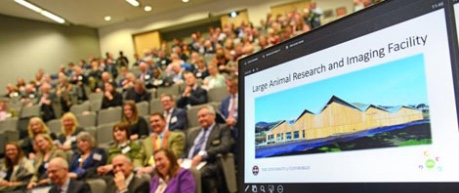Wednesday 11th March 2020, 2:00pm
The newly opened world-leading research facility will provide unprecedented insights into livestock and human health.

Research will additionally safeguard human health by helping to tackle food-borne infections and developing strategies against antimicrobial resistance.
The University’s Large Animal Research and Imaging Facility (LARIF), located on Easter Bush Campus and in close proximity to the Roslin Institute at the Royal (Dick) School of Veterinary Studies', was officially opened by Professor John Loughhead, Chief Scientific Adviser to the UK Department of Business, Energy and Industrial Strategy (BEIS).
Development of this purpose-built facility is supported by a £25 million investment from the University of Edinburgh and the Centre for Innovation Excellence in Livestock (CIEL), which includes £10.6 million of funding from Innovate UK, the UK’s Innovation Agency.
The LARIF houses an unparalleled combination of imaging, surgical, gene editing and infection containment facilities, and in turn offers exceptional specialist capability for in-depth studies into the health and wellbeing of all major farmed livestock.
Also housed at the LARIF is the Wellcome Trust-funded Critical Care Laboratory for Large Animals, which supports the study of large animal biology with all the resources of a human hospital. Highly skilled specialists in veterinary anaesthesia will provide round-the-clock care for animals involved in studies.
"The LARIF is a unique and world-leading facility that significantly enhances our ability to study human and animal health. Taking this multidisciplinary approach is a key focus for the University and can lead to significant advances in medicine, veterinary medicine and agricultural science."
Professor David Argyle, Head of the Royal (Dick) School of Veterinary StudiesAdvanced medical imaging equipment on site, including CT, MRI, fluoroscopy and ultrasound, enables detailed understanding of anatomy and body composition in livestock, as well as monitoring progression of disease processes in different organs, and their response to treatment.
Studies at the LARIF will also investigate human conditions. Large animal species are valuable biomedical models for studying human diseases and developing new medical technologies.
This new facility is situated close to CIEL-partnered livestock investments. Collectively, the Easter Bush Campus represents the largest concentration of animal science-related expertise in Europe.
"Agricultural technologies are a sometimes unrecognised but important component in supporting the agriculture industry to cut its emissions and develop sustainable farming practices – helping to meet the Government’s ambitions to reach net zero emissions by 2050. The LARIF illustrates the positive effects of successful collaboration between academia, industry and the Government in spreading knowledge and expertise while developing the technologies of the future."
Professor John Loughhead, Chief Scientific Adviser to the UK Department of Business, Energy and Industrial Strategy"Innovate UK has a strong track record of supporting the UK’s agriculture sector. The four Agri-Tech Centres that we have funded across the UK are crucial to our mission to boost this vital sector of our economy. The world-leading LARIF facility which we are inaugurating today will help the UK remain at the cutting edge of innovation in agriculture."
Dr Ian Campbell, Interim Executive Chair, Innovate UK"Our partnership in the LARIF brings a new dimension of expertise to CIEL’s extensive network of livestock research capability. It’s an exciting opportunity for industry to capitalise on the extraordinary work undertaken by the University of Edinburgh to deliver on the ‘One Health’ agenda."
Lyndsay Chapman, Chief Executive Officer, CIELSource: The Roslin Institute